It’s not really my intent to turn this into an oil and gas blog, but I go where the muse takes me, and she’s apparently spending a lot of time lately in the oilpatch, having heard about the healthy salaries and acknowledging that being a muse doesn’t pay like it used to.
Below are some photos that were forwarded to me from an unnamed source, showing the results of a Frac Job Gone Wild (not to be confused with a Spring Break phenomenon).
By the way, the Texas Railroad Commission has a website where you can find details about all reported blowouts and well control problems. This particular event is at the top of the list as of the date of this post, having occurred on February 28.
Frac jobs are routine – and routinely dangerous. There are all kinds of Bad Things that can happen when pumping huge amounts of fluid into the ground at tremendous pressures, and even the best preventive measures can’t always thwart a malevolent combination of physics and Mother Nature’s bad moods. In this case, the casing (which is heavy pipe cemented in place throughout the length of the well and designed to address a variety of issues, from groundwater protection to wellbore integrity) parted and blew out of the hole, becoming the world’s scariest javelin. Fortunately, there were no fatalities and only one injury (the person in the cab of the demolished truck suffered a concussion).
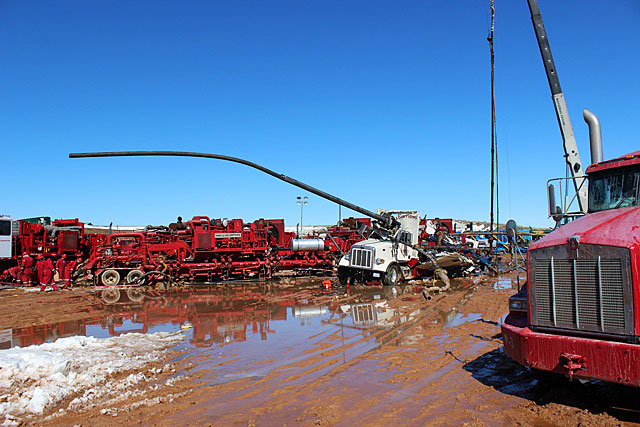
How would you like to call your insurance company about this?
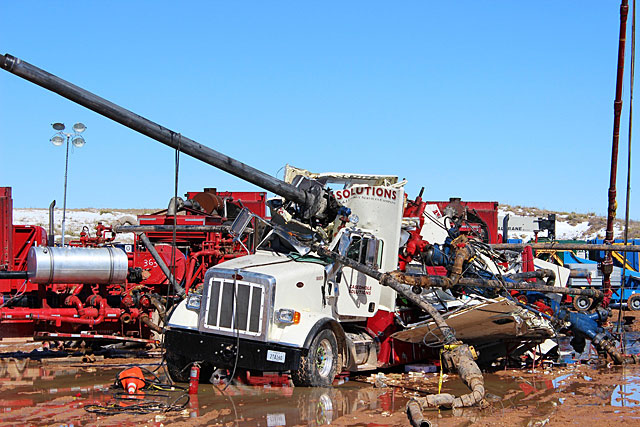
Hard to believe that the guy in the truck survived.
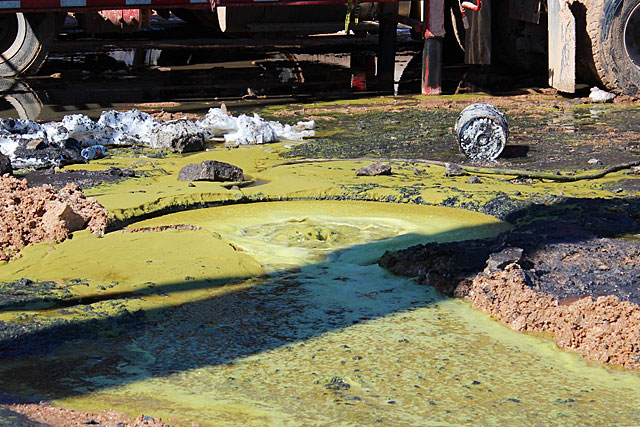
This is the well itself…or what’s left of it.
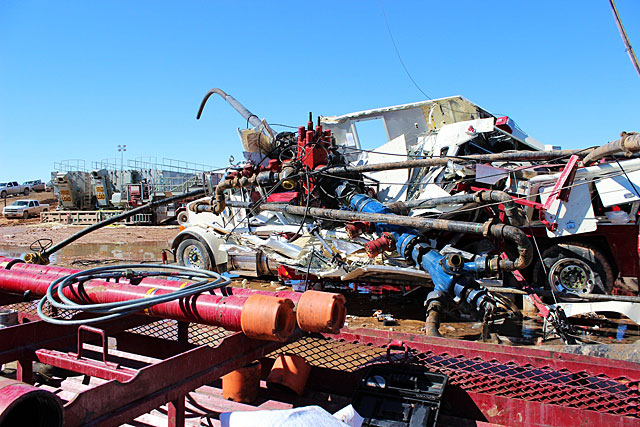
I’m no expert but I’m pretty sure this isn’t what a well site is supposed to look like.
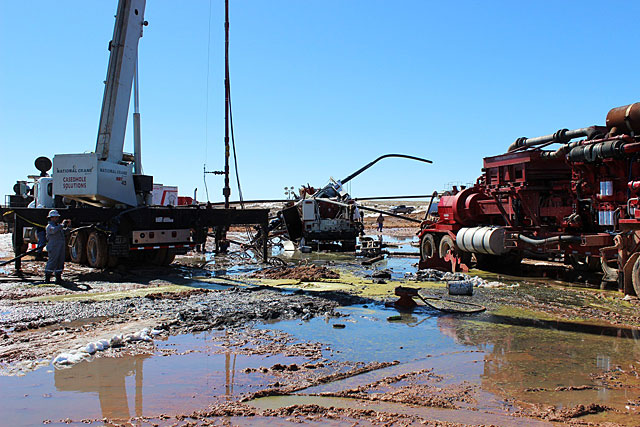
We normally see scenes like this from Siberian oilfields, not Texas locations.
If you ever question why oilfield salaries seem inordinately high, this illustrates one very good reason.
Discover more from The Fire Ant Gazette
Subscribe to get the latest posts sent to your email.

I have sinking, or maybe stinking, feeling in my gut these kind of frack ups happen in our urban areas. We demanded the companies put up 8 ft high masonary walls so we would not have to see a construction site but this also means we can’t see when this happens either.
I caught a company dumping there black water travel trailer waste in town and next door to a park. The only way I caught them was to go to the back side of the site and follow the smell. Without being able to see them it looks like they had been getting away with this for several months.
I am appalled at the magnitude of the damage caused by this poorly managed well site.
I disagree with your assumption that these things happen frequently. The Railroad Commission website I linked to lists 37 blow-outs or leaks related to drilling or fracing in Texas dating back to January, 2011. That’s out of an estimated 25,000+ wells drilled during that same period…a minute percentage. And I’m pretty sure that the majority of those incidents didn’t involve such catastrophic scenes as shown above.
That doesn’t mean there aren’t incompetent or uncaring operators, and whenever you run across such issues you should be reporting them to the RRC. There should be zero tolerance for willful violations of environmental and other operating regulations.
I am sure the TRRC caught every violation. It is pretty hard for the TRRC to be objective when there is so much money flowing into their campaigns from oil and gas. Even the Sunset Review Committee was scathing in their assessment of the agency and would like to change everything from their name to how the agency is run.
I lived in Wise County and can assure there was more than 37 leaks and spills from 2009 to 2010 in my area alone. With property owners force to sign non-disclosure statements so they can get the money they need to move safely away the spills, leaks, and blowouts are pretty hard to prove.
When we had a toxic drilling mud spill next door to the hospital here no one from the site voluntarily called the TRRC, our fire dept didn’t even know the TRRC was supposed to be called so I wouldn’t throw that data up as the gospel.
It is too bad the bad operators make it so hard for those of us who live in the gas patch to trust any operator. It takes more than buying a fire truck for a small volunteer fire dept. to fool most Texans.
Don’t confuse the reporting of blowouts and well control issues with leaks and spills. The latter can occur at any point in oil and gas operations; the former is limited to drilling and completion operations. I wasn’t trying to imply that there aren’t a large number of leaks and spills. My post is specifically directed to the more catastrophic events.
Care to elaborate on the toxicity of the drilling mud spill? That’s the kind of terminology that raises a red flag with me.
Catastrophic is open for interpretation don’t you think? If you only own 5 Herefords, they are all pregnant, and one night drink from a flow back tanked which causes 3 of them to die overnight going into flash pulmonary edema then that might be a little catastrophic to u be cause you just lost over 50% of your herd. This same scenario would not be “catastrophic” to a larger ranch so the meaning is open for interpretation.
The toxic drilling mud spill I speak of was related to was a gas well being drilled 300 ft from a playground, and residential area. Due to our SUP process we demanded a closed loop systems and no pit. One night the trucks were leaving the site with fully loaded 50 gallon barrels of drilling mud obtained during the flow-back process.
Supposedly one of the barrels fell off the truck on to the road. When the company found out I had a video of this they used a bulldozer to cover the area, not remove but cover. This is when I called our local fire dept and The TRRC. The man from Wichita TRRC showed up the next day and look at the pile of dirt covering the toxic mud spill and said “all is good”. When I asked about a sample of the spill i was told it was not necessary because they had covered it up per state law. Next heavy rain the dirt and whatever was in the spill was washed further down the road. Maybe not catastrophic to you but I don’t walk my dogs in that field or park anymore.
Sorry for the delay in approving your comment. I had to go out of town unexpectedly and when I got back I simply forgot about it.
Anyway, my intent wasn’t to debate the definition of catastrophic. I don’t disagree with what you’ve said. and I’m not an apologist for the incompetent or corrupt operators in my chosen profession.
But I’m still curious about the “toxic mud spill,” and why you choose that particular adjective. Was there a chemical analysis performed? If so, what components contributed to the toxicity? I’m truly curious.